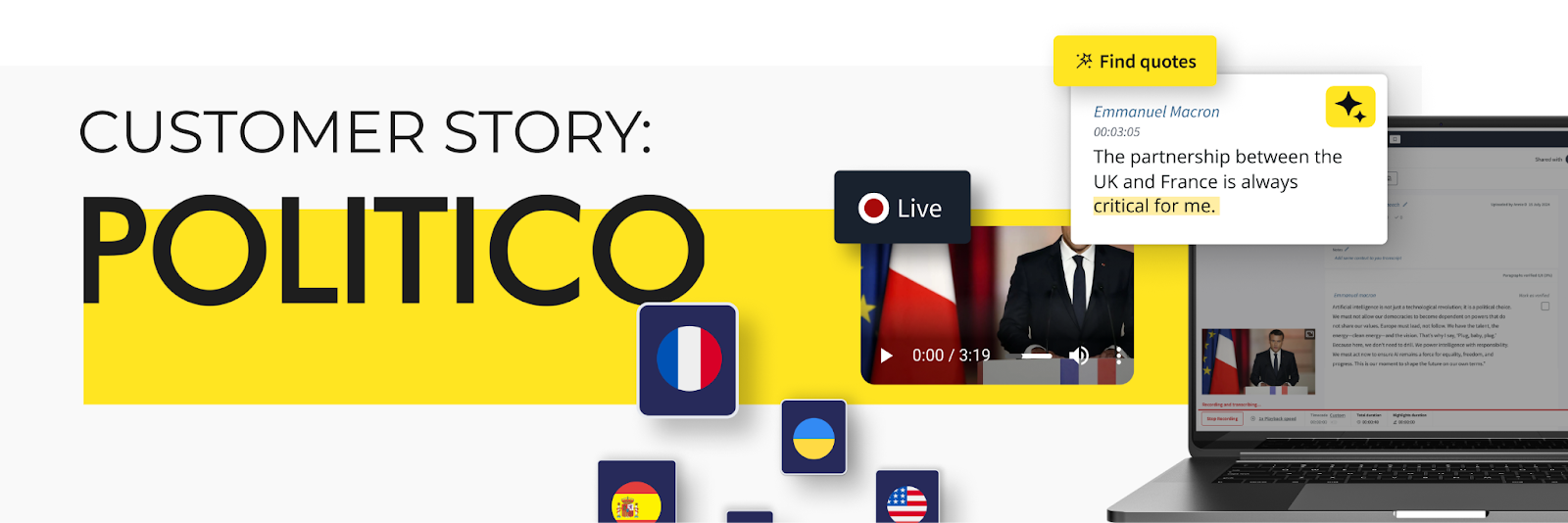
"Trint has been a game changer for us, honestly."
Marion Solletty, Editor-at-Large at POLITICO, is talking about how Trint has transformed daily operations across the newsroom and enhanced collaborative workflows.
As a leading voice in European and US politics, rapid, accurate transcription is key for POLITICO to help deliver insightful reporting. With Trint, reporters are able to remain fully engaged in conversations, knowing the recording will capture everything.
“We are talking to people in a lot of languages all the time,” says Solletty. “Being able to just click a button and have the transcript. Then if you roughly remember a couple of words you're looking for, you can just search and zoom in on that sentence. That's a huge time saver.”
Launched in the U.S. in 2007 and in Europe in 2015, POLITICO carved a distinct niche by covering politics for professionals and those deeply immersed in policy. "We cover politics in a very broad sense. Elections, parties and governments obviously. But also diplomacy, foreign affairs and general policy-making of all kinds," explains Solletty.
Like many news organizations, POLITICO has moved to a mostly digital-focused content stream with articles published on politico.eu and politico.com, as well as a B2B subscription service for more professional audiences. The organization has also become renowned for their Playbooks – early morning political newsletters published at 7am in key European capitals like Brussels, London, Paris and Berlin.
“They are kind of a must-read for the political class. That when you read this, you are ready for your day,” she says. “Playbooks include original reporting and fact-based insights into the day’s politics. We want readers to be ahead of the curve, so it’s a hot off the press thing.”
Solletty describes POLITICO's newsroom as "very traditional in the sense that we're really doing leadership reporting". Journalists are constantly talking to sources, attending press conferences and criss-crossing ministries and parliaments to gather information. At the same time, they are a modern organization that relentlessly chases scoops to provide round-the-clock and exclusive information to experts in their field. This approach relies heavily on being deeply sourced in governments, parliaments and the kind of bubble that surrounds politicians.
“We try to get as many politicians on the record as we can, which requires a lot of agility on a daily basis. Easy transcribing and having fast material to distribute that information is essential.”

Before Trint, Solletty recalls transcription was "definitely a pain point". Reporters would often record conversations but found full transcription too time-consuming, opting instead to take notes and re-listen to specific parts. “Typically the tools that we used before, I would describe as support for transcribing but not transcribing tools that make it easier to pinpoint time codes or listen to the recording while typing.”
Covering more than 28 languages across Europe and the United States, POLITICO's newsroom would also often interview sources in their native language and then be required to translate content into English for articles. "We write in English, but we talk to people in Germany, France, every corner of the EU in all kinds of languages," Solletty states.
Utilizing Trint's robust multi-language support, journalists like Solletty have been able to use the same tool for transcribing different languages without needing to juggle between different apps.
“That’s one of the things I like about Trint – having a one-stop shop for transcribing whatever language you are using that day has been really useful.”

Trint has significantly enhanced collaboration within POLITICO. "Being able to share both the recording and the transcript easily with teams is really useful," Solletty confirms. Given POLITICO's highly collaborative approach, where journalists often combine expertise for stories, easily sharing Trint files has made collaborative work less cumbersome across the newsroom.
Security is also paramount for POLITICO, particularly when dealing with confidential and high-level sources. Solletty noted the importance of Trint's security policies, which ensure recordings and data are not used to train AI models. "Source protection is super important for us. So yes, security settings obviously matter," she states.
Today, Trint is widely used across POLITICO's newsrooms. In Solletty's Paris team of 28 journalists, roughly two-thirds are reporters, and most use Trint on a daily basis.
“It has become a bit of a medium, saying ‘oh, can you share the Trint for that conversation?’ I think most reporters who have tried it now use it because it's facilitated a lot of our daily work.”

Solletty explained how POLITICO's parent company, Axel Springer, has adopted a "proactive and positive attitude towards AI". While AI is used for tasks like headline suggestions and research (always with human verification), and automated translation, Solletty emphasizes that POLITICO's core value lies in "information gathering" that AI cannot replicate. "AI doesn't have sources inside the government," she points out.
At POLITICO, AI is viewed as a facilitator for tasks like generating drafts, but human journalists retain the responsibility for fact-checking and content. The industry's future, Solletty believes, will place an even higher premium on "journalistic instincts and creativity". AI cannot replicate the ability to find new angles, sniff out weak signals, or build in-person connections with sources.
"AI isn't going to do that for you, but your readers will want to read that stuff," Solletty concludes, underscoring the enduring importance of human-driven insight in the evolving newsroom.